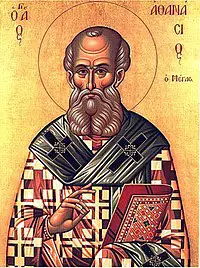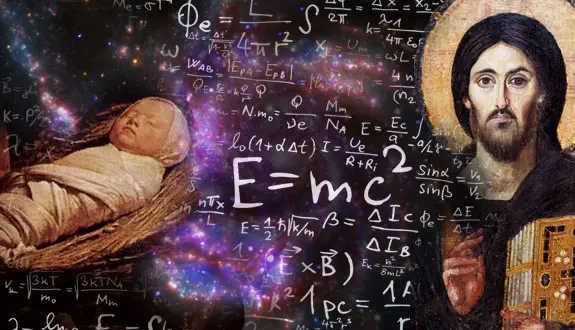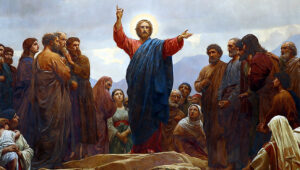God’s knowledge and understanding are beyond measure. Indeed, Scripture describes God in incomparable terms. For example, it says God knows all things,[1] and His understanding is infinite and inscrutable.[2] The Bible also says that God knows the secrets of the heart and understands every intent of the thoughts.[3] In addition, it says that God reveals the profound and hidden things.[4] He also knows what we are going to say before we say it, and what we need before we ask Him.[5] Truly, who can fathom the depths of God’s wisdom and knowledge:
Romans 11:33 (NASB) Oh, the depth of the riches both of the wisdom and knowledge of God! How unsearchable are His judgments and unfathomable His ways!
God is omniscient
Some have termed such divine knowledge as omniscience which is defined as “having complete or unlimited knowledge, awareness, or understanding; perceiving all things.”[6] Although not stated in any of the creeds from the seven ecumenical Church councils, it is assumed by those who uphold the doctrine of the Trinity, that each member of the godhead is himself omniscient. The reason being that since God the Father is all-knowing, and since Jesus and the Holy Spirit are equal to the Father, they too are omniscient.[7]
Jesus Didn’t Know Everything
If we are to be faithful followers of Christ, however, we must deal with the contradiction that exists between Church dogma and the word of God. We must not overlook or downplay the fact that Scripture reveals there are some things that Jesus didn’t know.
 For example, when the woman with the issue of blood touched the hem of his garment, Jesus didn’t know who it was:
For example, when the woman with the issue of blood touched the hem of his garment, Jesus didn’t know who it was:
Luke 8:45-46 (NASB) And Jesus said, “Who is the one who touched Me?” And while they were all denying it, Peter said, “Master, the people are crowding and pressing in on You.” 46 But Jesus said, “Someone did touch Me, for I was aware that power had gone out of Me.” (emphasis added)
How could Jesus possess the power to heal the woman and yet not know who had touched him? In addition, Jesus knew that Lazarus had died even though his sisters had only sent word that he was sick. Yet Jesus did not know where his tomb was located.[8]
John 11:34 (NASB) and [Jesus] said, “Where have you laid him?” They *said to Him, “Lord, come and see.” (emphasis added)
Compared to raising Lazarus from the dead, one would think that knowing the location of his grave would be easy, that is, if you are God. Nevertheless, Jesus had to ask.
Jesus didn’t know, but he did know?
Obviously, a contradiction exists between the claim that Jesus is omniscient and passages such as these that reveal his lack of knowledge. Some try to resolve the inconsistency by saying that Jesus actually did know these things but simply feigned ignorance. But such an explanation makes Jesus disingenuous at best and a liar at worst. We must be careful not to demean him in an effort to remedy the contradiction that orthodoxy presents. Instead, it is imperative that we address the contradiction Biblically.
There are greater areas of concern regarding things Jesus didn’t know. For instance, when Jesus was twelve, his parents found him in the temple where he was evidently receiving instruction from the teachers of the law:
Luke 2:46-47 (NASB) Then, after three days they found Him in the temple, sitting in the midst of the teachers, both listening to them and asking them questions. 47 And all who heard Him were amazed at His understanding and His answers. (emphasis added)
Later, we read in John’s account that even as an adult Jesus didn’t know everything. The man from Nazareth said that he was taught by the Father. To be sure, the Great Teacher had a Teacher:
John 8:28 (NASB) So Jesus said, “When you lift up the Son of Man, then you will know that I am He, and I do nothing on My own initiative, but I speak these things as the Father taught Me. (emphasis added)
Jesus then taught others what God had taught him:
John 7:16-17 (NASB) So Jesus answered them and said, “My teaching is not Mine, but His who sent Me. 17 “If anyone is willing to do His will, he will know of the teaching, whether it is of God or whether I speak from Myself. (emphasis added)
John 14:24 (NASB) “He who does not love Me does not keep My words; and the word which you hear is not Mine, but the Father’s who sent Me. (emphasis added)
We should find it troublesome that the Word of God had to be taught what words to say. Unfortunately, many scholars do not adequately deal with the fact that Jesus grew in wisdom[9] or that he was taught by God. For example, popular Bible teacher and author, A.W. Tozer’s argument for God’s omniscience inadvertently negates that of Christ’s:
To say that God is omniscient is to say that He possess perfect knowledge and therefore has no need to learn. But it is more: it is to say that God has never learned and cannot learn. The Scriptures teach that God has never learned from anyone…From there it is only one step to the conclusion that God cannot learn. Could God at any time or in any manner receive into His knowledge that He did not possess and had not possessed from eternity, He would be imperfect and less than himself. To think of a God who must sit at the feet of a teacher, even though that teacher be an archangel or a seraph, is to think of someone other than the Most High God, make of heaven and earth.[10]
Tozer, a Trinitarian who identifies “God” as the Father, Son and Holy Spirit,[11] not only contradicts Jesus, his discourse disqualifies the Messiah from being God. Tozer says God cannot learn and has never learned. Yet, once again Scripture says that Jesus had some things to learn:
Hebrews 5:8 (NASB) Although He was a Son, He learned obedience from the things which He suffered. (emphasis added)
Perhaps even more damaging to the supposition that Jesus is the all-knowing-God, is the fact that Jesus didn’t know when he would return to inaugurate the kingdom of God:
Matthew 24:36 (NASB) “But of that day and hour no one knows, not even the angels of heaven, nor the Son, but the Father alone.[12] (emphasis added)
 If Jesus is truly God, how could he not know the day of his return and the commencement of his earthly reign? Indeed, Jesus’ statement that he didn’t know the day or the hour refutes orthodoxy’s claims that he knows all things. But that’s not the only problem Trinitarians face because Jesus isn’t the only member of the triune deity to be in the dark about the greatest event in the history of the world. By saying that the “Father alone knows” means that the Holy Spirit doesn’t know either. Are we to reason that it’s because the so called third member of the Trinity set aside his omniscience? Or is Jesus somehow an unreliable witness? Can we trust Jesus when he says that the time of his return was established by the Father’s authority, meaning not by his own or that of the Spirit?
If Jesus is truly God, how could he not know the day of his return and the commencement of his earthly reign? Indeed, Jesus’ statement that he didn’t know the day or the hour refutes orthodoxy’s claims that he knows all things. But that’s not the only problem Trinitarians face because Jesus isn’t the only member of the triune deity to be in the dark about the greatest event in the history of the world. By saying that the “Father alone knows” means that the Holy Spirit doesn’t know either. Are we to reason that it’s because the so called third member of the Trinity set aside his omniscience? Or is Jesus somehow an unreliable witness? Can we trust Jesus when he says that the time of his return was established by the Father’s authority, meaning not by his own or that of the Spirit?
Acts 1:6-7 (NASB) So when they had come together, they were asking Him, saying, “Lord, is it at this time You are restoring the kingdom to Israel?” 7 He said to them, “It is not for you to know times or epochs which the Father has fixed by His own authority;[13] (emphasis added)
When confronted with the glaring discrepancy between orthodoxy and Scripture, some are quick point to various passages where Jesus knows “unknowable” things. They do so in an effort to prove he is God despite his nescience (lack of knowledge). For example, some point to passages that say Jesus knew the thoughts and hearts of men as evidence that he is God:
Matthew 9:3-4 (NASB) And some of the scribes said to themselves, “This fellow blasphemes.” 4 And Jesus knowing their thoughts said, “Why are you thinking evil in your hearts? (emphasis added)
But such knowledge, as remarkable as it is, does not negate the truth that Jesus lacked knowledge in other areas. In order to be truly omniscient one must know all things, not just some remarkable things. Moreover, there are other ways besides omniscience that Jesus could have known such things, as we shall see momentarily.
Unscriptural Attempts to Resolve the Contradiction
Perhaps the primary means by which orthodoxy tries to resolve the problem is to appeal to the theory of the hypostatic union, that is, the notion that Jesus possessed two natures, one human, the other divine. They attribute Jesus’ nescience to his human nature, speculating that his supposed divine nature was in full possession of the knowledge that his human nature was unaware of.[14] This theory, however, is not in Scripture. Rather, it was developed over time by the Church Fathers who reasoned that Jesus must have had dual natures so as to do and experience things they perceived only a human or the divine could do. One such Church Father, Athanasius of Alexandria (298-373 AD), rationalized that even though Jesus said he didn’t know the hour or the day, he actually did know. But this fourth century Church Father who appealed to the dual nature theory, flatly contradicts Jesus who said he didn’t know:

Now, why it was that, though he knew, He did not tell His disciples plainly at that time, no one may be curious where He has been silent; for Who has known the mind of the Lord, or who has been His counselor? But why, though He knew, He said, ‘no, not the Son knows,” this I think none of the faithful is ignorant [namely] that He made this as those other declarations as man by reason of the flesh. For this as before is not the Word’s deficiency, but of the human nature whose property it is to be ignorant…[15] (emphasis added)
Unlike the early Jewish Christians who understood Jesus to be a man, the Hellenized Church Fathers viewed Jesus in metaphysical terms which only served to create confusion and controversy for generations to come. This is why it is so important to read the Bible as a Jewish book.
In addition, others have tried to resolve Jesus’ nescience by interpreting Philippians 2:7 to mean that Jesus set aside or emptied himself of certain divine attributes when he was incarnated. Known as the kenotic theory, it too creates problems such as how does God empty himself of divine attributes and yet remain God? Or how does the God-Man keep his human nature from availing itself of divine knowledge? Most significantly, Paul’s letter does not specify that Jesus emptied himself of divine knowledge or attributes and neither does the rest of Scripture.
The early Church did not believe Jesus to be God-incarnate. Rather, they naturally understood him to be a man sent by God to be the Messiah. Professor of Biblical studies, Michael Goulder, explains:
The truth is that Jewish sources never thought of Messiah as divine or pre-existent—in mainstream Judaism he is the descendant of David’s covenant in 2 Samuel 7… If Jesus thought of himself as Messiah it is this human figure that he had in mind, with the traditional terms “the Son of God,” “the Son of Man,” “Lord”—all used of human Jewish kings in the Psalter (2:7; 80:18; 110:1, etc.)… Being a monotheist, Jesus cannot have thought of himself sanely as being Yahweh; and in the more primitive traditions he always speaks of himself in the human, messianic categories… [He did not think] he was God, but that he was God’s viceroy… It is the bias of orthodoxy constantly to overlook middle terms. The earliest church [did not view him] as God the Son, but as the man whom God raised up and [assigned] the Holy Spirit to pour out upon the church (Acts 2:33).[16]
 Indeed, Jesus never claimed to be God but affirmed that the Father is the only true God, while he was the human Christ:
Indeed, Jesus never claimed to be God but affirmed that the Father is the only true God, while he was the human Christ:
John 17:1-3 (NASB) Jesus spoke these things; and lifting up His eyes to heaven, He said, “Father…3 “This is eternal life, that they may know You, the only true God, and Jesus Christ whom You have sent.
John 8:40 (NASB) “But as it is, you are seeking to kill Me, a man who has told you the truth, which I heard from God; this Abraham did not do. (emphasis added)
Moreover, Peter and Paul never taught that Jesus was God, rather they said he was a man chosen by God to be the Messiah (Christ):
Acts 2:22 (NASB) “Men of Israel, listen to these words: Jesus the Nazarene, a man attested to you by God with miracles and wonders and signs which God performed through Him in your midst, just as you yourselves know— (emphasis added)
Acts 17:31 (NASB) because He [God the Father] has fixed a day in which He will judge the world in righteousness through a Man whom He has appointed, having furnished proof to all men by raising Him from the dead.” (emphasis added)
1 Timothy 2:5 (NASB) For there is one God, and one mediator also between God and men, the man Christ Jesus, (emphasis added)
Even demons understood that Jesus was not God, but the one sent by God:
Luke 4:34 (NASB) “Let us alone! What business do we have with each other, Jesus of Nazareth? Have You come to destroy us? I know who You are—the Holy One of God!” (emphasis added)
What’s more, Catholic historians have observed that the doctrine of Jesus’ omniscience (what did he know and when did he know it) developed over time.[17] Professor of Bible and Theology, Kerry McRoberts’ observation supports this:
In the second century the apostolic fathers displayed an undeveloped Christology. The relationship between the two natures in Christ, the human and the divine, is not clearly articulated in their works.[18] (emphasis added)
In other words, even as late as the 2nd century, the theory of Jesus having two natures is not spelled out in the writings of these prolific authors. Furthermore, by the 5th century, Church historians understand that the matter of Jesus’ omniscience remained undecided. Even after the Nestorian controversy[19], there was still no unanimous belief regarding Jesus’ omniscience. Moreover, during the early Scholastic period (c. 1100 AD) the matter was still being debated.[20] Thus, to say Jesus was omniscient in his divine nature, but nescient in his human nature is decidedly a post-Biblical development.
How Could Jesus Have Known the Unknowable?
Even today, orthodox Christianity has difficulty in understanding, articulating and defending their complicated dual nature position. Father Jim Martin says:
Now here is a tough theological question. If Jesus is fully divine, which he is, wouldn’t he know all things?…On the other hand, if Jesus is fully human, which he is, he had a human consciousness, and so he needed to be taught something before he could know it…The question of Jesus’ knowledge is a very complicated one.[21]
On the contrary, the Bible offers clear, uncomplicated answers as to how Jesus could know certain “unknowable” things without being omniscient.
Jesus was full of the Holy Spirit
Scripture tells us that Jesus was anointed by the Spirit of God without limit:[22]
John 3:34 (NASB) “For He [Jesus] whom God has sent speaks the words of God; for He gives the Spirit without measure.
 Part of the anointing Jesus received from God was a spirit of wisdom, understanding and knowledge:
Part of the anointing Jesus received from God was a spirit of wisdom, understanding and knowledge:
Isaiah 11:1-2 (NASB) Then a shoot will spring from the stem of Jesse, And a branch from his roots will bear fruit. 2 The Spirit of the LORD will rest on Him, The spirit of wisdom and understanding, The spirit of counsel and strength, The spirit of knowledge and the fear of the LORD.
Why would God need to be filled with the Holy Spirit? It is illogical. On the other hand, Jesus of Nazareth would certainly need the Spirit of God in order to fulfill his ministry. Interestingly, even after being exalted to God’s right hand, Jesus still received knowledge from God. Many erroneously believe that Jesus is the source of the revelation John received regarding end time events. However, the text actually says that God gave the revelation to Jesus who then delivered the message to John via an angel:
Revelation 1:1 (NASB) The Revelation of Jesus Christ, which God gave Him to show to His bond-servants, the things which must soon take place; and He sent and communicated it by His angel to His bond-servant John
If Jesus inherently possesses all knowledge, it makes no sense that God would have to give him revelation knowledge, especially after his exaltation. But in each of the letters Jesus sends to the seven churches, he says, “hear what the Spirit says.”[23] As we learned in a previous post, the Holy Spirit, Spirit of God and Spirit of the Father are all synonymous terms for God the Father. The Spirit of God gave Jesus knowledge he didn’t possess. Jesus in turn presented it to John via his angel.
Jesus, the Prophet
One of the expressions of the Spirit’s ministry in Jesus’ life was that of prophecy. We know with certainty that Jesus is the prophet that Moses promised God would send.[24] The Jews recognized Jesus in this God-given ministry:
Luke 24:19 (NASB) And He said to them, “What things?” And they said to Him, “The things about Jesus the Nazarene, who was a prophet mighty in deed and word in the sight of God and all the people (emphasis added)
As God’s prophet, Jesus would, of course, be given knowledge that he otherwise could not have known. For example, when Jesus told the Samaritan woman things that were not possible for him to know in the natural realm, she credited him with being a prophet:

John 4:15-19 (NASB) The woman *said to Him, “Sir, give me this water, so I will not be thirsty nor come all the way here to draw.” 16 He *said to her, “Go, call your husband and come here.” 17 The woman answered and said, “I have no husband.” Jesus *said to her, “You have correctly said, ‘I have no husband’; 18 for you have had five husbands, and the one whom you now have is not your husband; this you have said truly.” 19 The woman *said to Him, “Sir, I perceive that You are a prophet…29 “Come, see a man who told me all the things that I have done; this is not the Christ, is it?”
The woman at the well understood that the Christ would have a prophetic ministry, that is, he would know by the Spirit of God things that were outside his natural ability to know. But instead of crediting God with speaking to His prophet, which would be a logical and Biblical conclusion, some want to turn Jesus’ prophetic knowledge into divine omniscience.
In a similar fashion, Peter knew things about Ananias and Sapphira that he otherwise could not have known:
Acts 5:1-3 and 7-9 (NASB) 1 But a man named Ananias, with his wife Sapphira, sold a piece of property, 2 and kept back some of the price for himself, with his wife’s full knowledge, and bringing a portion of it, he laid it at the apostles’ feet. 3 But Peter said, “Ananias, why has Satan filled your heart to lie to the Holy Spirit and to keep back some of the price of the land?…7 Now there elapsed an interval of about three hours, and his wife came in, not knowing what had happened. 8 And Peter responded to her, “Tell me whether you sold the land for such and such a price?” And she said, “Yes, that was the price.” 9 Then Peter said to her, “Why is it that you have agreed together to put the Spirit of the Lord to the test? Behold, the feet of those who have buried your husband are at the door, and they will carry you out as well.“

Peter knew this couple was lying, but no one assumes it’s because he was omniscient. We reasonably conclude that Peter knew because God had revealed it to him. After all, Scripture says that Peter was filled with the Holy Spirit.[25]
In addition, the prophet Agabus knew there was going to be a great famine, not because he was omniscient, but because the Spirit told him:
Acts 11:27-28 (NASB) Now at this time some prophets came down from Jerusalem to Antioch. 28 One of them named Agabus stood up and began to indicate by the Spirit that there would certainly be a great famine all over the world. And this took place in the reign of Claudius.
The same could be said of Elisha and Daniel and other prophets to whom God “reveals His secret counsel.”[26]
The Holy Scriptures
Some of the things that are attributed to Jesus’ omniscience can be explained by his knowledge of God’s Word. For example, on the night Jesus was betrayed, we’re told that Jesus knew all the things that were going to happen: [27]
John 18:4 (NASB) So Jesus, knowing all the things that were coming upon Him, went forth and *said to them, “Whom do you seek?” (emphasis added)
Some wonder how Jesus could have known this unless he is God. However, Jesus was a student of Scripture. According to one source, Jesus quoted the Old Testament seventy-eight times.[28] As such he knew of the prophecies regarding the Messiah and how he would be despised, forsaken, a man of sorrows, scourged and even that his betrayer would be paid thirty pieces of silver.[29] Could God have given him additional information? In all likelihood, He did, but Jesus knew enough from Scripture to be aware of what to expect.
 John 19:28 (NASB) After this, Jesus, knowing that all things had already been accomplished, to fulfill the Scripture, *said, “I am thirsty.” (emphasis added)
John 19:28 (NASB) After this, Jesus, knowing that all things had already been accomplished, to fulfill the Scripture, *said, “I am thirsty.” (emphasis added)
In another example, we’re told that Jesus knew what was in man:
John 2:24-25 (NASB) But Jesus, on His part, was not entrusting Himself to them, for He knew all men, 25 and because He did not need anyone to testify concerning man, for He Himself knew what was in man. (emphasis added)
How could Jesus have known what was hidden in all men? By reading Scripture:
Jeremiah 17:9 (NASB) “The heart is more deceitful than all else and is desperately sick; Who can understand it?[30]
It’s quite likely that the Father gave Jesus additional insight, but there is much Jesus would have learned just from reading the sacred texts.
Human Reason
Some of what Jesus knew came by way of observation, reason and perception; things that we all possess. For example:
Matthew 22:18-19 (NASB) But Jesus perceived their malice, and said, “Why are you testing Me, you hypocrites? 19 “Show Me the coin used for the poll-tax.” And they brought Him a denarius.
The word perceived in the Greek is ginôskô and it means to come to know, recognize, perceive. The same word is used when one looks at the sky to know (perceive) what the weather will be.[31] Or when the Pharisees heard Jesus’ parables they understood (perceived) that he was speaking about them.[32] Thus, it is important  to credit Jesus’ human reasoning when appropriate.
to credit Jesus’ human reasoning when appropriate.
Misunderstanding of the Text
Another reason Jesus is assumed to have an innate special knowledge is that we simply misunderstand the context of a particular passage. For example, some rely on the following passage to “prove” Jesus is omniscient:
John 16:30 (NASB) “Now we know that You know all things, and have no need for anyone to question You; by this we believe that You came from God.”[33]
Upon closer examination, the text does not support the position that Jesus is the all-knowing God. Note that the disciples believed Jesus’ knowledge was proof that he had come from God, not that he was God.
Others may offer this verse as an additional proof text:
John 21:17 (NASB) He *said to him the third time, “Simon, son of John, do you love Me?” Peter was grieved because He said to him the third time, “Do you love Me?” And he said to Him, “Lord, You know all things; You know that I love You.” Jesus *said to him, “Tend My sheep.
If the phrase you know all things is an indicator of omniscience and deity, then Jesus’ followers must be gods as well:
Jude 1:5 (NASB) Now I desire to remind you, though you know all things once for all, that the Lord, after saving a people out of the land of Egypt, subsequently destroyed those who did not believe.
In both of these passages the scope of all things is determined by the context. In the first passage, all things refers to Peter’s affection and devotion to Christ, while the latter verse refers to the judgment that is to come upon the unbelieving and the ungodly.
Jesus credits God
Far from being omniscient, Jesus credits God with divine knowledge. In a confrontation with the Pharisees, Jesus rebuked them for their self-righteousness and warned that God knew their hearts:
Luke 16:14-15 (NASB) Now the Pharisees, who were lovers of money, were listening to all these things and were scoffing at Him. 15 And He said to them, “You are those who justify yourselves in the sight of men, but God knows your hearts; for that which is highly esteemed among men is detestable in the sight of God.
Jesus credits God, whom he identifies as the Father,[34] with knowing the hearts of men.
Conclusion
Although orthodoxy has conferred an innate divine knowledge upon Jesus, Scripture says otherwise. Jesus knew many things that were beyond his ability to know, not because he is omniscient, but because God revealed them to him. As one author says:
So Scripture reveals that Christ only knew what He had learned as a man and what His Father revealed to Him through His Spirit. Since our Father in Heaven knows all things, then Christ could also effectively know all things “if” the Spirit of God revealed it to Him. Thus if Jesus did not know the hour of His return it could only be because His Father had not revealed this to Him, and we are not told the reason why this was the case.[35]
The various theories that are offered in an attempt to explain how Jesus could be both omniscient and nescient are not found in the Bible. Moreover they are complex, confusing and inadequate. Unfortunately, orthodoxy has cast the heavy anvil of heresy upon the backs of those who choose not to accept the extra-Biblical explanations. As Pope Damascus said in 382 AD, one year after the doctrine of the Trinity was established as the official dogma of the Church:
If anyone does not say that the Son of God is the true God just as [His] Father is true God [and] He is all-powerful and omniscient and equal to the Father, he is a heretic.[36]

When we find there is a contradiction between our dogma and the word of God, let us examine the Scriptures and hold fast to that which is true. For it’s possible that which man calls heresy, God calls orthodoxy. As William Whiston (1667-1752), associate of Sir Isaac Newton, once said:
There is but One Supreme, Living, Eternal, Infinite, Omniscient, Omnipotent, and Invisible God; the Father of our Lord Jesus Christ…[37]
Amen.
[1] 1 John 3:20.
[2] Psalm 147:5 and Isaiah 40:28.
[3] Psalm 44:21 and Acts 15:8; 1 Chronicles 28:9.
[4] Daniel 2:22
[5] Psalm 139:4; Matthew 6:8
[6] “omniscient” Dictionary.com, accessed 9-6-19, https://www.dictionary.com/browse/omniscient
[7] The Council of Nicaea in 325 AD determined Jesus to be co-equal with God the Father. The Council of Constantinople in 381 AD determined the Holy Spirit to be co-equal with God the Father and God the Son.
[8] John 11:14 and 34.
[9] Luke 2:40, 52.
[10] A. W. Tozer, The Knowledge of the Holy, chapter 10 (HarperCollins, 1961).
[11] Tozer, chapter 4.
[12] See also Mark 13:32 and Zechariah 14:7.
[13] Acts 17:24 and 30-31.
[14] Matt Perman, “How Can Jesus Be God and Man, ” Desiring God, October 5, 2006, accessed 9-20-19, https://www.desiringgod.org/articles/how-can-jesus-be-god-and-man
[15] Athanasius, Discourse Against the Arians, Chapter 28, (c. 370). Christian Classics Ethereal Library, accessed 9-16-19, https://www.ccel.org/ccel/schaff/npnf204.xxi.ii.iv.vi.html
[16] Michael Goulder, Incarnation and Myth: the Debate Continued, ( Eerdman’s, 1967), p. 143
[17] Knowledge of Jesus Christ, Christian Answers Encyclopedia, accessed 9-16-19, https://www.catholic.com/encyclopedia/knowledge-of-jesus-christ
[18] Kerry D. McRoberts, “The Holy Trinity,” Systematic Theology (Revised Edition, Stanley M. Horton, ed.), p. 155.
[19] For a summary of the Nestorian Controversy see: https://en.wikipedia.org/wiki/Nestorianism
[20] Knowledge of Jesus Christ, Catholic Online, accessed 9-16-19, https://www.catholic.org/encyclopedia/view.php?id=6328
[21] Father Jim Martin, “Jesus Didn’t Know Everything,” Catholic TV, accessed 9-16-19, http://www.catholictv.org/shows/ten-things-know-about-jesus/jesus-didnt-know-everything
[22] Luke 4:1
[23] Revelation 2:11, 17, 29; 3:6, 13, 22.
[24] Deuteronomy 18:15; Acts 3:22, 7:37; Matthew 21:11
[25] Acts 2:3-4; 4:8; 4:31.
[26] 2 Kings 5:25-27; Daniel 2:28-30; Amos 3:7
[27] John 6:64; 13:1, 11; 18:4.
[28] “The Old Testament in the New,” accessed 9-18-19, https://authenticinfluence.wordpress.com/small-group-studies/the-old-testament-in-the-new/
[29] Isaiah 53; Zechariah 11:12-13; Matthew 27:6-10; John 6:69-71; Numbers 21:9; John 3:14-15; 12:32; 19:28; Acts 3:18.
[30] See also Ecclesiastes 9:3.
[31] Matthew 16:3 (the word “know”).
[32] Matthew 21:45 (the word “understood).
[33] See also John 21:17
[34] John 17:1, 3
[35] “Was Jesus Omniscient and Omnipotent on Earth?” AmRedeemed, May 23, 2017, accessed 9-18-19, https://amredeemed.com/bible-study/jesus-omniscient-omnipotent-earth/
[36] Council of Rome, Tome of Pope Damacus, Canon 12 (382 AD) (Denzinger, 29th ed., No.31.) As quoted in Jesus’ Omniscience, Part II, https://www.youtube.com/watch?v=jkUYKDnIkns, accessed 9-16-19
[37] William Whitson, as quoted in “Theos, Search for the One True God,” One God, One Lord, accessed 9-20-19, http://www.onegodonelord.com/theos-9




I think it is very clear that before Jesus was glorified he was not omniscient. But now that he is glorified and the head of the church he certainly knows about ALL that happens in the church. I understand this to be made clear in Revelation where Jesus knows what is happening in his church and in all of his people. This is the main idea of the fact that he now has the seven spirits of God that go into all the world – he knows what is going on.
Good thoughts, Chuck. Thanks for sharing! I share similar thoughts in the article, “God Searches the Hearts and Minds of All Men.” https://onegodworship.com/god-searches-the-hearts-and-minds-of-all-men/
Blessings,
OGW
It’s refreshing to see someone who is not blinded by tradition. I consider myself fortunate to have read the bible on my own as a child as the bible is written such that a child can understand it. I found it bizarre how so many of the myriad traditions and doctrines of man plainly contradict the bible and that fellow Christians justified syncretism with pagan customs. For me, mainstream Christianity evolved from those clinging to their pagan practices and philosophies while draping themselves in a veneer of Christianity because of its appeal. Please continue the good work and explorations in the truth.
Thank you, Allan, for your observations and words of encouragement! Yes, it must be simple enough for a child to understand, and indeed it is!
May the God of Jesus keep you in His care,
OGW
Hi again. I am surprised that such a well-done presentation hasn’t had more comments. I was expecting it to be replete with comments such as the Messiah’s request to have the cup of death removed if at all possible, and his expression of having a separate will, or the two swords, or the culling of the fig tree in line with commandment but on the mistaken notion of the fig season. You did an excellent work, and it should better known. When I read your quote of Tozer’s description of God, I remember thinking of Revelation 14:15. An angel comes forth from Yahweh God in the Sanctuary of the heavenly temple, loudly conveys the command of Yah to reap, informing him the time of the Harvest has come. Since my early youth when people would respond that Matt 24:36 and Mark 13:32 were before the Messiah ascended, I would point out Rev 14:15. I have never had anyone come up with a counter yet. Those that argue that it wasn’t time for so-called human half seem to be baffled why he wouldn’t know now, after two millennium. I believe that day is coming soon. Thankyou for your work. Hold fast to the truth, strong in the faith and love Yahweh provides. May a multitude of ears and eyes be opened. May an eagerness of spirit for accurate knowledge, and a craving to act in love towards one another be poured out around the world so that more can drink, bathe and swim in the clean waters of our most beneficent Elohim.Thanks for this page.
Thanks Allan for your kind words and encouragement! And a hearty amen to your prayer!
Another one that many Trinitarians appear to haven’t considered is after the thousand years ends, when the Messiah turns over the kingdom to our Father, God, so that God can be all things to all people. It’s like they can’t conceive that our anointed king would turn over sole rule to the Father after a thousand years. They think he is going to rule forever, but the rulership was always supposed to be Yahweh’s. Israel and Judah were only ruled by kings because Yahweh granted that request. Eden wasn’t set up as a human kingdom. There will be a return to an even grander Eden I am sure.
Greetings, Allan,
Thanks for reading and commenting!
I had read 1 Cor. 15:22-28 countless times but did not have eyes to see the eternality of Jesus’ subordinationism. Thankfully, I now see that Jesus is the human messiah, just as Scripture declares him to be. Truly, God the Father is the Almighty and will be all in all!
Wow very well done and presented. It would be foolish for one to hold onto their doctrinal creed after seriously and honestly considering the Scriptures you brought forth.
I used some of your information in my talks with a trinitarian and will send him over to your website.
God bless and may the truth of Gods word begin to shatter all false doctrines and man made ideas!
Thanks, Cris, for the encouraging words! So glad the information has been helpful. Appreciate you sharing the site with your friend. May we all grow in wisdom and knowledge of the One true God and his Son.
Blessings,
OGW